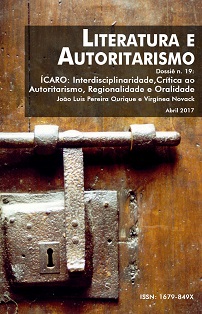Reflections on the question of literary representation in ‘Enfeitiçados todos nós’, by Lourenço Cazarré
DOI:
https://doi.org/10.5902/1679849X26593Keywords:
Authoritarianism, Power, Literary criticismAbstract
This paper aims to analyze the prejudice, feature of patriarchal societies - while element in the constitution and formation of patriarchal societies - based on the reading and interpretation of literary texts produced by gauchos authors, which privilege the investigation of the relations of power and authoritarianism in Rio Grande do Sul’s society. Initially, some considerations about the relations between literature and society are presented, followed by verification of power and prejudice in the literary works. The investigation will be developed through the authors Caio Fernando Abreu and the text Terça-feira gorda, and Lopes Neto, starting from the text O negro Bonifácio, which although historically distand are also close because allow the same patriarchalist and prejudiced approach of the society in which the characters belong. Thus, this paper is based on authors such as Theodor Adorno (2003), Walter Benjamin (1985), Antonio Candido (2000) among others.Downloads
References
ABREU, Caio Fernando. Morangos Mofados. São Paulo: Companhia das Letras, 2005.
ADORNO, W. Theodor. Palestra sobre lírica e sociedade. In: . Notas de Literatura I. Tradução: Jorge Almeida. São Paulo: Duas Cidades; Editora 34, 2003.
ARAÚJO, Hiram. Carnaval: Seis Milênios de História. Rio de Janeiro: Editora Gryphus, 2003.
BHABHA, Homi. O local da cultura. Tradução de Mirian Ávila et al. Belo Horizonte: UFMG, 1998.
BENJAMIN, Walter. O autor como produtor. In: BENJAMIN, Walter. Magia e técnica, arte e política. Tradução: Sérgio Paulo Rouanet. São Paulo: Brasiliense, 1985.
BORDINI, Maria da Glória; AGUIAR, Vera Teixeira de. Literatura – a formação do leitor. Alternativas metodologias. Porto Alegre: Mercado Aberto, 1993.
CANDIDO, Antonio. Literatura e Sociedade. São Paulo: T. A. Queiroz, 2000; Publifolha, 2000. - (Grandes nomes do pensamento brasileiro).
CARVALHAL, Tânia F. Literatura Comparada. 4. ed. revista e ampliada. São Paulo: Ática, 1998.
FOUCAULT, Michel. Microfísica do Poder. 4. ed. Rio de Janeiro: Graal, 1984.
GEBAUER, Günter; WULF, Christoph. Mimese na cultura: agir social, rituais e jogos, produções estéticas. Tradução: Eduardo Triandopolis. São Paulo: Annablume, 2004.
GIRARD, René. A violência e o sagrado. Tradução de Martha Conceição Gambini. São Paulo: Paz e Terra, 1998.
GIROUX, Henry. Teoria crítica e resistência em educação: para além das teorias de reprodução. Tradução de Ângela Maria B. Biaggio. Petrópolis: Vozes, 1986.
MAGNANI, Maria do Rosário M. Leitura, literatura e escola: a formação do gosto. São Paulo: Martins Fontes, 1989.
NETO, João Simões Lopes. Contos Gauchescos e Lendas do Sul. Porto Alegre: Globo, 1981.
NIETZSCHE, Friedrich. O nascimento da tragédia ou helenismo e pessimismo. Tradução, notas e posfácio: J. Guinsburg. São Paulo: Companhia das Letras, 2007.
REIS, Roberto. Cânon. In: JOBIM, José Luís (org.) Palavras da crítica. Rio de Janeiro: Imago, 1992.
SARLO, Beatriz. Literatura y autoritarismo. In: SARLO et al. Autoritarismo. Buenos Aires: Goethe, 1991.
SEMPRINI, Andrea. Multiculturalismo. Tradução de Laureano Pelegrin. Bauru: Edusc, 1999.
ZILBERMAN, Regina. A literatura no Rio Grande do Sul. Porto Alegre: Mercado Aberto, 1992.
Downloads
Published
Versions
- 2022-03-16 (2)
- 2017-04-10 (1)
How to Cite
Issue
Section
License
DECLARAÇÃO DE ORIGINALIDADE E EXCLUSIVIDADE E CESSÃO DE DIREITOS AUTORAIS
Declaro que o presente artigo é original e não foi submetido à publicação em qualquer outro periódico nacional ou internacional, quer seja em parte ou na íntegra. Declaro, ainda, que após publicado pela Literatura e Autoritarismo, ele jamais será submetido a outro periódico. Também tenho ciência que a submissão dos originais à Literatura e Autoritarismo implica transferência dos direitos autorais da publicação digital. A não observância desse compromisso submeterá o infrator a sanções e penas previstas na Lei de Proteção de Direitos Autorais (nº 9610, de 19/02/98).






